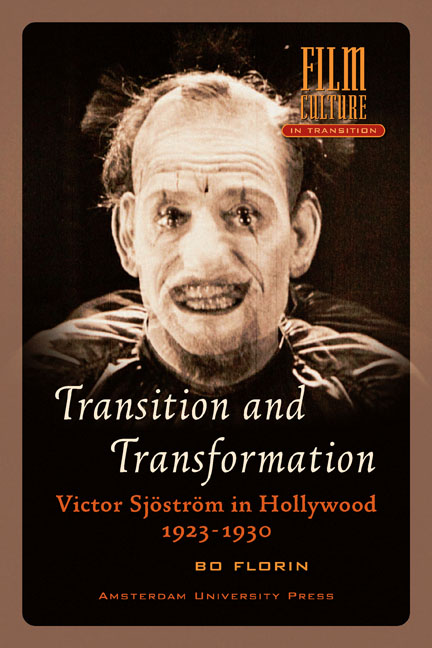Book contents
- Frontmatter
- Contents
- Acknowledgements
- Introduction – From Sjöström to Seastrom
- Sjöström – From National to International
- A European in Hollywood – NAME THE MAN and the Shift of Production Systems
- From Scientist to Clown – HE WHO GETS SLAPPED
- A for Adultery – THE SCARLET LETTER
- Conquering Nature – THE WIND
- Fragmented Pieces – Writing the History of the Lost Hollywood Films
- The Shadow of the Silents – A LADY TO LOVE
- The Genius and the System– Some Concluding Remarks
- Notes
- Bibliography
- Filmography
- Index
- Film Culture in Transition
The Genius and the System– Some Concluding Remarks
Published online by Cambridge University Press: 22 December 2020
- Frontmatter
- Contents
- Acknowledgements
- Introduction – From Sjöström to Seastrom
- Sjöström – From National to International
- A European in Hollywood – NAME THE MAN and the Shift of Production Systems
- From Scientist to Clown – HE WHO GETS SLAPPED
- A for Adultery – THE SCARLET LETTER
- Conquering Nature – THE WIND
- Fragmented Pieces – Writing the History of the Lost Hollywood Films
- The Shadow of the Silents – A LADY TO LOVE
- The Genius and the System– Some Concluding Remarks
- Notes
- Bibliography
- Filmography
- Index
- Film Culture in Transition
Summary
Contemporary critics just like later film historians seem to have read the history of Victor Sjöström's years in Hollywood in a quite ambiguous manner: as both a story of success and a story of failure. This, of course, relates to the different degrees of critical or public success of each film at the time of its release. These ideas of success or failure have since then also undergone historical changes, in Sjöström's case particularly concerning the reception of THE WIND. The fact that only three of Sjöström's silent films have survived in their entirety has, of course, also added to their relative importance in a historical perspective, as Sjöström is above all considered a director of silents. The fact that all these three films are available on YouTube or Google Video confirms their particular status; they seem to incarnate the very aspect of success in the director's American career.
But this ambiguity is also related to certain judgements of value, depending on the perspective of the critic. According to some commentators, mostly international, the director was successful in Hollywood to the extent that he adapted to Hollywood, just as Thompson argued in the case of Lubitsch: that he was actually transformed into a Hollywood director by the transition to a new film culture. It has even been argued that he actually contributed to introducing a higher degree of naturalism in Hollywood cinema. From a quite opposite perspective, several Swedish commentators express quite strong opinions on which films during the Hollywood years could be considered as “Sjöström films” and which should not. Here, it is striking that the perspective of researchers does not differ all that much from that of other commentators. From such a perspective, too, the Hollywood years were considered a success only to the extent that the director was able to free himself from the supposedly damaging restraints of the Hollywood system. The lack of variation is striking in these comments from critics or researchers from both sides, who – apart from certain specific judgements – all seem to agree upon the general continuity between Sweden and Hollywood without, however, being able to argue their point in any detail.
- Type
- Chapter
- Information
- Transition and TransformationVictor Sjöström in Hollywood 1923–1930, pp. 133 - 136Publisher: Amsterdam University PressPrint publication year: 2013



